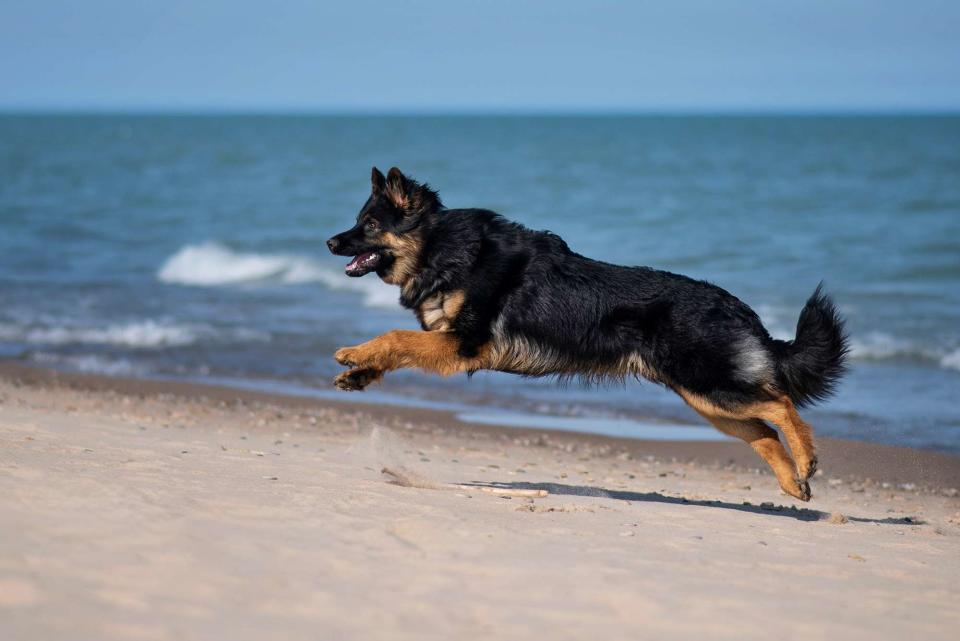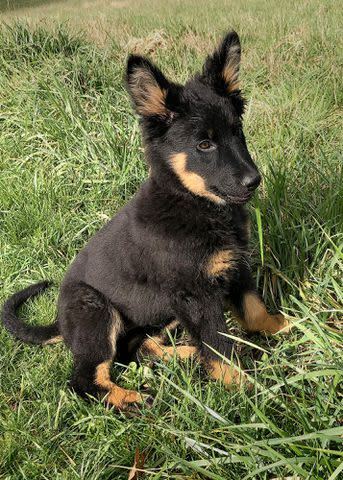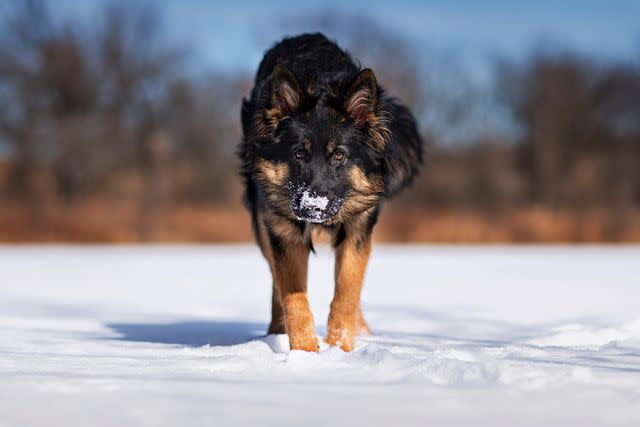Bohemian Shepherd: Dog Breed Characteristics and Care
History, Care Tips, and Helpful Information for Pet Owners

Agnieszka Koszyk
The Bohemian shepherd, also known as the Chodský Pes, is a medium dog breed originally from the Czech Republic. While similar in appearance to the German shepherd, the Bohemian shepherd has a longer coat that is primarily black with tan-rusty markings and shorter upright, closely carried ears. This breed has a long history as versatile working dogs, taking on duties as devoted guardians and skillful livestock herders.
Although Bohemian shepherds are still extremely new and rare in the United States, they’re beloved for their loving nature, liveliness, and loyalty.
Learn more about the care and characteristics of the Bohemian shepherd.
Breed Overview
GROUP: Herding (AKC Foundation Stock Service)
HEIGHT: 21 to 22 inches (males); 19 to 21 (females)
WEIGHT: 41 to 60 pounds (males); 37 to 53 pounds (females)
COAT: Straight or wavy, medium-length double coat
COAT COLOR: Black with tan markings
LIFE SPAN: 12 to 15 years
TEMPERAMENT: Loyal, bright, calm, active, courageous
HYPOALLERGENIC: No
ORIGIN: Czech Republic
Characteristics of the Bohemian Shepherd
Friendly, intelligent, and devoted, the Bohemian shepherd (BHS) is a big-hearted dog that loves their people above all else. A bright and beautiful breed, the BHS is highly trainable and relishes having a job to do. They display an extraordinary enthusiasm for all kinds of activities, no matter whether it's participating in dog sports and nose work or lounging beside you on the couch and enjoying life’s little moments. To put it simply, they love doing anything and everything as long as they’re with their favorite person.
Considering their happy, loyal temperament, Bohemian shepherds make wonderful family dogs, getting along with children and pets with proper socialization early on. Bohemian Shepherd Club of North America (BSCNA) club founder Lisa Speyer and co-founders Zdenek Rokos and Agnieszka Koszyk say the BHS is a loyal companion who you can count on to always be close by and watch over you with their kind, almond-shaped eyes. As with any breed of dog, it’s best to teach young children how to gently interact with their canine companions and always supervise any interactions.
The club members say they love how Bohemian shepherds read their humans, almost as if they can read their minds. Their affectionate and versatile demeanor sets them apart from many other breeds.
“They are friendly, love people, and are the happiest when with their people—no matter where and no matter what activity,” they say.
Affection Level | High |
Friendliness | High |
Kid-Friendly | High |
Pet-Friendly | Medium |
Exercise Needs | High |
Playfulness | Medium |
Energy Level | Medium |
Trainability | High |
Intelligence | High |
Tendency to Bark | Medium |
Amount of Shedding | Medium |
History of the Bohemian Shepherd
The Bohemian shepherd originated in the 1300s and is known to be one of the oldest Czech dog breeds. Developed in the west Bohemian region of Chodsko, the Bohemian shepherd helped guard the borders between Bohemia and Bavaria. They also excelled in farm work, particularly herding. The breed is also known as the Bohemian Herder, Czech sheepdog, or Chodenhund.
The breed declined and faced near extinction following World War II. However, Vilem Kurz and Jan Findejs reestablished the breed in 1984, which led to the approval of the breed standard and the first litter born the following year.

Georgia Towle
In November 1991, the Czech club for the Bohemian shepherd, Klubu Přátel Chodského Psa (KPCHP), was founded to promote and preserve the breed.
While the BHS is most popular in the Czech Republic, they’re becoming more sought after in other parts of the world now, too. The Northern American breed club (BSCNA) was founded in 2018 and has helped the Bohemian shepherd population grow from four to about 100 within the past 12 years, Rokos says. In 2019, the Bohemian shepherd was provisionally recognized by the Fédération Cynologique Internationale (FCI) and accepted into the American Kennel Club’s Foundation Stock Service.
Bohemian Shepherd Care
Due to the Bohemian shepherd’s heritage, these dogs are at their best when they’re able to put both their bodies and minds to work. Provide them with plenty of opportunities to learn, exercise, and play, and watch them thrive. Though their long, thick coats do shed, they only require moderate grooming.
Exercise
Being medium- to high-energy dogs, Rokos says the BHS requires a minimum of 45–90 minutes of daily exercise through a combination of activities like fast walking, quality sniffing walks, training, playtime sessions, and dog sports. And with proper training and conditioning, some can even participate in long-distance trekking sports with great stamina.
“One thing that stands out about this breed is their versatility and adaptability,” Rokos says. “They will do any activity with enthusiasm as long as they are with their humans.”
As much as the BHS enjoys putting their mind and body to work, they also have a good off-switch and are content to relax if they’re not able to go outside for a walk or play. They’re truly up for whatever, whenever.

Agnieszka Koszyk
To keep a Bohemian shepherd mentally stimulated, Rokos recommends the following activities:
Nosework (e.g. at home looking for treats or odors, or nosework classes)
Exploring new places
“Any kind of training during the course of the day provides mental stimulation,” he says. “Even going for a drive gives them a chance to observe and to absorb information.”
Grooming
Despite their long, thick coats, Bohemian shepherds only require weekly or biweekly brushing to prevent mats and tangles. The BHS has a luxurious, insulated double coat that protects them from weather conditions and physical injuries. This coat will shed more in the spring and fall, so a good undercoat rake will come in handy to remove the undercoat seasonally, BSCNA says.
When grooming, it’s important to never shave a BHS because it can damage their undercoat. They can be rinsed if they get dirty, but limit shampooing to only when necessary so their skin doesn't lose the necessary oils. Additionally, trim your dog’s nails every month or so and check their ears for any excess debris or wax buildup weekly. To maintain good dental health, brush their teeth daily.
Training
BSCNA considers Bohemian shepherds easily trainable due to their high intelligence and eagerness to please. “They are quick learners, and they enjoy the activity of learning,” they say.
It’s best to use positive reinforcement training methods with a BHS. Provide them with consistent praise, plenty of treats, and find ways to keep training fun to keep your Bohemian shepherd interested.
It’s never too early to start training, BSCNA says. The club started gradually training their own dogs right away, working on potty training, basic commands, and crate training.
As puppies, it’s important to keep them busy to prevent boredom and possibly unwanted, destructive behaviors. When exercising your BHS puppy, Rokos says to do so carefully, as their growth plates aren’t fully closed until they reach two years old.
Common Health Problems
The Bohemian shepherd is known to be a very healthy breed. But just like any other dog breed, there are some potential hereditary health issues to look out for, such as:
Before purchasing a Bohemian shepherd, make sure to request proof of required tests for hip dysplasia and degenerative myelopathy, as the club says the Czech breed club and most other clubs mandate tests for these conditions.

Zdenek and Susanne Rokos
Diet and Nutrition
A Bohemian shepherd needs high-quality, well-balanced dog food to stay happy and healthy and keep their double coat nice and shiny, Rokos says. When feeding your Bohemian shepherd, feed a diet that’s appropriate for their life stage and activity level to ensure they’re getting adequate nutrition.
Diets can vary depending on a pet parent’s preference. Rokos says some pet parents feed a raw food diet, a high-quality kibble, or a combination of both. Regardless, it’s important to make sure your dog’s food is balanced and complete. To learn more about choosing the right dog food for your Bohemian shepherd, consult a veterinarian for personalized options that are best based on their age, health status, activity level, and individual needs.
When giving treats to your BHS, keep it within 10 percent of their daily calories to prevent unwanted weight gain. Make sure to always have fresh, clean water available.
Where to Adopt or Buy a Bohemian Shepherd
The Bohemian shepherd is an incredibly rare breed in America. Because of this, a BHS can cost between $1,600–$2,000 depending on each breeder and country, the club says. They add that there are additional shipping costs of about $1,200 or travel costs if a pet parent is picking up a puppy in person, which is what most breeders prefer.
Those interested in a BHS should be prepared to provide enough physical activity and mental stimulation, tolerate some barking, and work with them if they get too excited or display leash reactivity around other dogs, the club says.
For further information to help you find a Bohemian shepherd:
Contact the breed club BSCNA at bscnainfo@gmail.com. The club works with reputable breeders in Europe to help import puppies and says it’s very important to support breeders who follow preservation breeding using genetics and Embark mate matching.
Check out AKC Bohemian shepherd breeders
Due to being a rare breed, the club says the chance of finding a BHS in a shelter is extremely unlikely, as the American population is only about 100 dogs.
Bohemian Shepherd Overview
Bohemian shepherds can make wonderful dogs with families who are committed to giving them the mental and physical stimulation they need each day. If you're looking for a couch buddy, they aren't the dog for you.
Pros of the Bohemian Shepherd
Friendly, loyal, and alert
Loves to be around their family, including children and other pets
Highly intelligent and easily trainable
Good watchdog
Cons of the Bohemian Shepherd
Vocal and can be expected to bark often
Requires moderate daily exercise
May engage in destructive behavior if bored as a puppy
Can be hard to acquire compared to other breeds
15 Dogs That Look Like German Shepherds
More Dog Breeds and Further Research
Before deciding whether the Bohemian shepherd is the right dog for you, make sure to do thorough research on their care and needs to learn if they’re compatible with your lifestyle. Talk with Bohemian shepherd owners, reputable breeders, and veterinary professionals for more information.
If you’re interested in breeds that are similar to the Bohemian shepherd, check out:
There’s a whole world of potential dog breeds out there—with a little research, you can find the right one to bring home.
Frequently Asked Questions
What's the difference between a Bohemian Shepherd and a German shepherd?
While the two look very similar, a Bohemian shepherd is smaller in size, has a straighter back, and a longer, black coat compared to a German shepherd. The BHS has smaller ears closer together with long fur at the base.
Are Bohemian shepherds good dogs?
Yes! Bohemian shepherds are wonderful companions and family dogs who love to spend time with their people. They also get along with children and other pets.
How many Bohemian shepherds are in the U.S.?
There are only about 100 Bohemian shepherds in the United States, according to Zdenek Rokos, co-founder of the Bohemian Shepherd Club of North America (BSCNA).
Read the original article on The Spruce Pets.

